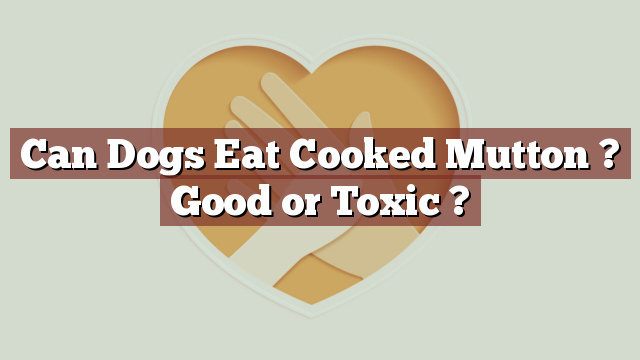Can Dogs Eat Cooked Mutton? Good or Toxic?
Dogs are known for their curious nature when it comes to food, and as responsible dog owners, it is crucial to be aware of what is safe for our furry friends to consume. While dogs are primarily carnivorous animals, with a diet that typically consists of meat, it is important to question whether cooked mutton is a suitable addition to their diet. In this article, we will explore the nutritional value of cooked mutton, discuss its safety for dogs, potential risks or benefits, and provide guidance on what to do if your dog consumes cooked mutton.
Nutritional Value of Cooked Mutton: Essential Nutrients for Dogs
Cooked mutton offers several essential nutrients that can be beneficial for dogs. It is a rich source of protein, which is crucial for muscle development and repair. Mutton also provides various vitamins and minerals, such as iron, zinc, and B vitamins, which are important for maintaining a healthy immune system and promoting overall well-being. Additionally, mutton contains fats that provide energy and support the absorption of fat-soluble vitamins.
Can Dogs Eat Cooked Mutton? Understanding Safety and Toxicity
Yes, dogs can safely consume cooked mutton as long as it is prepared properly and given in moderate amounts. However, it is important to note that cooked mutton bones should never be given to dogs, as they can splinter and cause choking or damage to the digestive system. Always ensure that the mutton is thoroughly cooked, without any seasonings or added ingredients that may be harmful to dogs.
It is worth mentioning that some dogs may have specific dietary restrictions or sensitivities, and in such cases, it is advisable to consult with a veterinarian before introducing cooked mutton into their diet.
Potential Risks or Benefits of Feeding Dogs Cooked Mutton
While cooked mutton can provide valuable nutrients to dogs, there are also potential risks associated with its consumption. One risk is the high fat content of mutton, which can lead to weight gain and obesity if fed excessively. Dogs with certain health conditions, such as pancreatitis or gastrointestinal issues, may be more sensitive to high-fat foods and should therefore avoid or restrict their intake of cooked mutton.
Additionally, mutton may cause an allergic reaction in some dogs. It is essential to monitor your dog for any signs of food allergies, such as itching, diarrhea, or vomiting, after introducing cooked mutton into their diet. If any adverse reactions occur, it is recommended to discontinue feeding mutton and consult with a veterinarian.
What to Do If Your Dog Eats Cooked Mutton: Monitoring and Actions
If your dog accidentally consumes cooked mutton, it is important to monitor their behavior and watch out for any potential adverse effects. If the mutton was properly cooked and the dog is not showing any signs of distress, there is generally no cause for concern. However, if you notice any unusual symptoms such as vomiting, diarrhea, abdominal pain, or difficulty breathing, it is essential to seek immediate veterinary attention.
Conclusion: Balanced Approach to Feeding Cooked Mutton to Dogs
In conclusion, cooked mutton can be a nutritious addition to a dog’s diet when prepared and served in the right manner. Dogs can safely consume cooked mutton as long as it is properly cooked, boneless, and given in moderation. However, it is crucial to be aware of any potential dietary restrictions or sensitivities your dog may have. Remember to monitor your dog’s reaction to the mutton and consult with a veterinarian if you have any concerns or questions regarding your dog’s diet. By maintaining a balanced approach and prioritizing your dog’s health and well-being, you can safely incorporate cooked mutton into their meals.
Thank you for investing your time in exploring [page_title] on Can-Eat.org. Our goal is to provide readers like you with thorough and reliable information about various dietary topics. Each article, including [page_title], stems from diligent research and a passion for understanding the nuances of our food choices. We believe that knowledge is a vital step towards making informed and healthy decisions. However, while "[page_title]" sheds light on its specific topic, it's crucial to remember that everyone's body reacts differently to foods and dietary changes. What might be beneficial for one person could have different effects on another. Before you consider integrating suggestions or insights from "[page_title]" into your diet, it's always wise to consult with a nutritionist or healthcare professional. Their specialized knowledge ensures that you're making choices best suited to your individual health needs. As you navigate [page_title], be mindful of potential allergies, intolerances, or unique dietary requirements you may have. No singular article can capture the vast diversity of human health, and individualized guidance is invaluable. The content provided in [page_title] serves as a general guide. It is not, by any means, a substitute for personalized medical or nutritional advice. Your health should always be the top priority, and professional guidance is the best path forward. In your journey towards a balanced and nutritious lifestyle, we hope that [page_title] serves as a helpful stepping stone. Remember, informed decisions lead to healthier outcomes. Thank you for trusting Can-Eat.org. Continue exploring, learning, and prioritizing your health. Cheers to a well-informed and healthier future!

